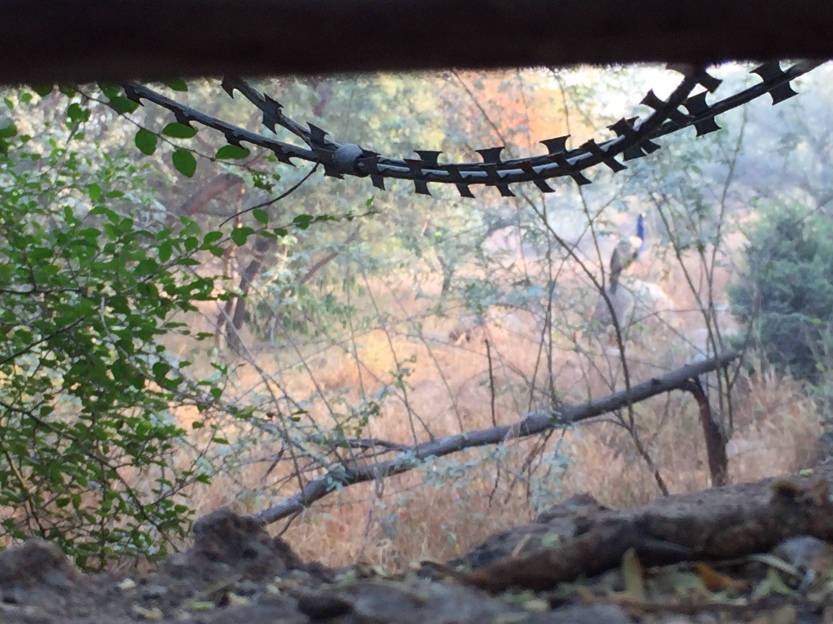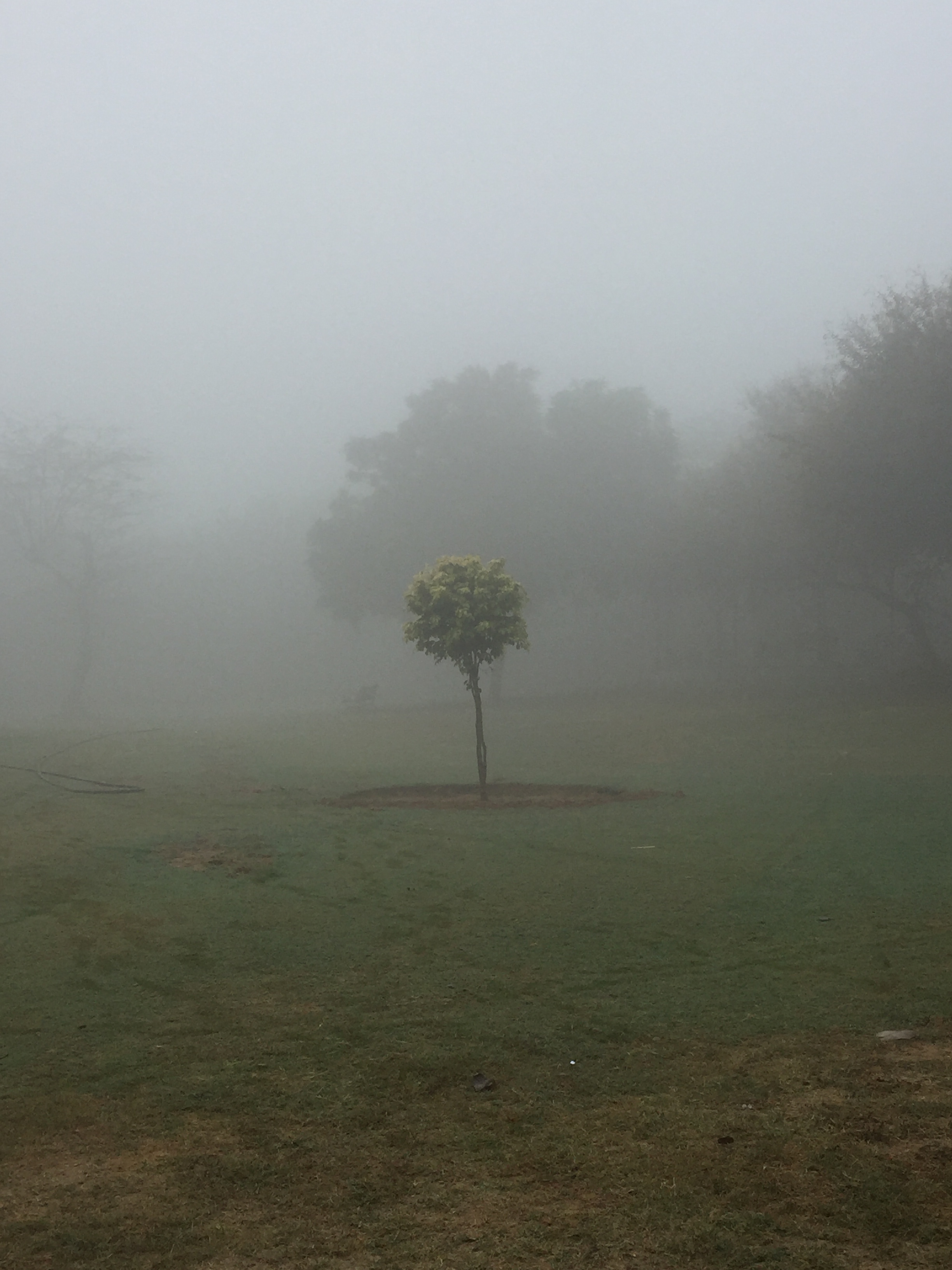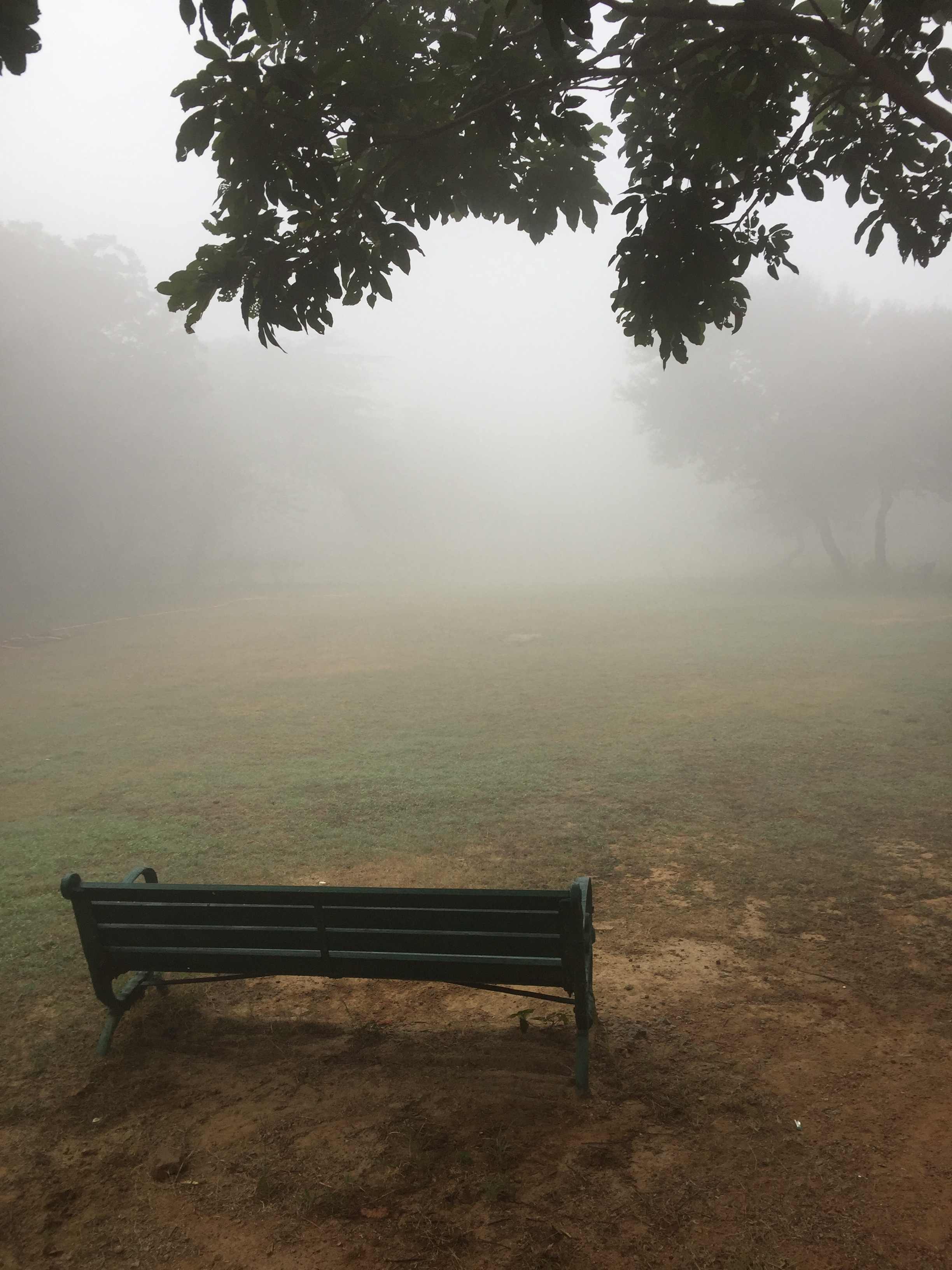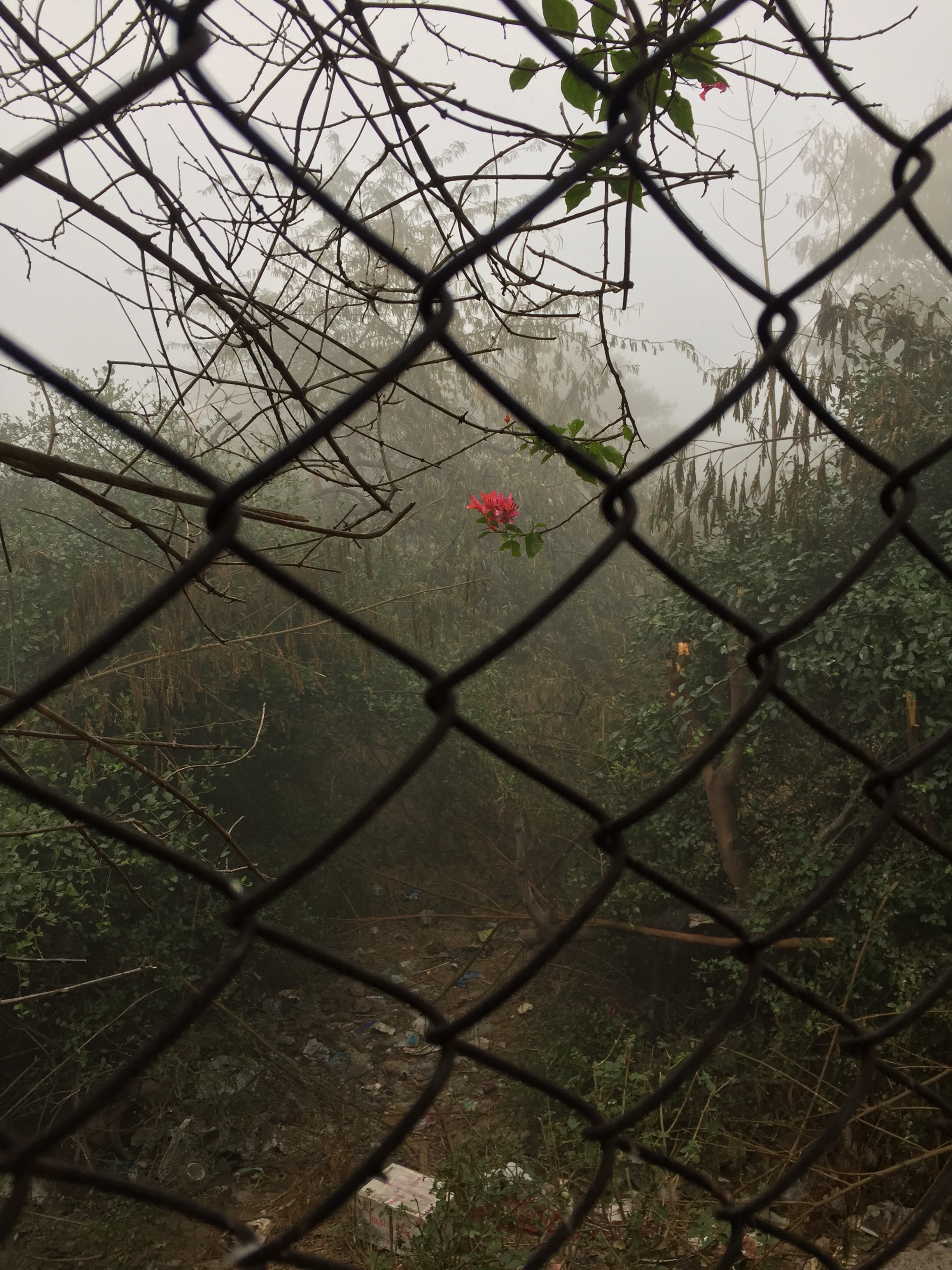Lisa Radhika Kaul
I have rosy cheeks. They appear unsolicited, whether in the heat of the summer or the freezing cold of winter. The color in my cheeks comes neither from the artful touch of a brush, nor the gentle nudge of a blush. From afar, I can look a picture of glowing health. Only those who have known me before can tell. Offsetting my optimistic visage are my furrowed brow and narrowed, exhausted eyes. My rosiness, courtesy of a mixed connective tissue disease, is merely a rash in masquerade.
DIAGNOSIS VERSUS FEELING ROTTEN
I was ‘diagnosed’ twelve years ago on one of those magical June days in Oxford, when I didn’t have to carry an umbrella or wait for a bus. The sun was shining and the sky was an impossibly gorgeous shade of blue. David, the young consultant at the Infectious Disease Unit, waved the results of my blood-work at me and said in clear, somewhat satisfied, and unequivocal terms that I had “Lupus.” He added solicitously, probably recalling a patient-skills class, that his sister, too, had recently been diagnosed. Like her, I would need to stop nursing my son, start on a steroid, and see a rheumatologist. (The order might well have been different, but that is how I remember it.) He then requested me to model my ‘butterfly rash’ for his young residents. Apparently, I was ‘text-book perfect!’
On the ride home one single thought ricocheted around the empty spaces of my blank mind: I would have to stop nursing my son immediately. Trailing in its wake was the afterthought that I was neither ready nor willing to do so.
Once home, the familiar electronic chatter of my dial-up comforted me as I tried to discern and deconstruct what I had just heard. Systemic Lupus Erythematosus (SLE), the technical version of Lupus, I learned was an auto-immune disease that could be an uncomfortable thing to live with. It was elusive, slithery, and unpredictable. Given to tantrums and flares, it wasn’t necessarily life threatening. I spent the next week in anaconda mode trying to digest what I had been told.
It had been barely a week ago that my GP had sent me to the Infectious Disease Unit at the local hospital to find a cause for my persistent low-grade fever as well as the scaly reptilian eruptions on my hands and back. I had been feeling rotten for several months and the doctor whom I had previously seen had put my eruptions and fatigue down to the stress of new motherhood. Something prompted me to seek a second opinion from a female doctor. And this doctor was made anxious enough by whatever she saw that she wanted to get me ‘sorted out’ immediately. Since I had recently returned from a vacation in India she secured an appointment for me at Infectious Diseases on the same day that I saw her. So, when I entered the hospital, I was unprepared: I was distracted by the needs of my 16 month old son and unsettled by the fact that whatever I had could not be detected or treated in the warm and comfortable environs of my GP’s practice. Instead, it had required my transfer to the cold, impersonal space of a hospital. The young, eager, and clearly able doctor asked me a slew of questions all of which seemed presciently applicable to what I had been experiencing, but had not yet expressed to my primary doctor. I left the hospital grateful that my child had allowed me to be prodded, pricked and questioned undisturbed only to face the disconcerting realization that I had somehow managed to misplace my house keys during that long day. In hindsight, I suppose I ought to have read more into that serendipitous merging of events. Instead, I treated myself to an early take-out dinner from my favorite Lebanese restaurant, which I savored amid the cheerful mayhem of the local park while waiting for my husband to return with with the all-important keys.
When I was handed the diagnosis, I was stunned into disbelief not merely by the fact that I had received one, but by the nature of the one that I had received. I had gone to the Infectious Disease unit expecting to be told – at worst – that I had picked up some third world bacteria or virus that could easily be treated. I wasn’t ready to hear that I had a low-grade fever despite the absence of any form of infection. I certainly wasn’t ready to hear that my body had lost its ability to distinguish friend from foe and was attacking its own cells. Neither was I prepared for a life-long sentence with a plebian, pedestrian, illness that could at best be kept ‘under control,’ but could not be cured. It all felt rather surreal and abrupt, although I did feel a tad relieved to receive formal affirmation for what I had been going through, especially since I had often wondered whether it was ‘all in my head.’
My world was further thrown into disarray when, about ten days later, I visited the rheumatologist’s office. She refused to categorize me as having a ‘full-blown’ case of SLE until I had further tests. Lupus is a difficult disease to diagnose because it is a famous mimicker, and there is no single test to diagnose it. Moreover, since it tends to affect more women than men, doctors are often dismissive of symptoms arguing that they are merely cases of ‘women seeking attention.’ Hence it can often take years before a ‘proper’ diagnosis.
Following protocol, this rheumatologist referred me to another specialist. He in turn ordered a new battery of tests to rule out other conditions. It took a couple of months, including a move to another country, and trips to four other rheumatologists before I settled on one I could entrust myself to. Several vials of blood later, she couldn’t provide me with with what I thought was a ‘conclusive’ answer either. I had symptoms and diagnositics of an overlapping group of connective tissue diseases (one of which was Lupus). In medical parlance she classified me as having a ‘mixed connective tissue disease.’ In ordinary speak, I got the buffet. Or maybe, I was the buffet.
There is a qualitative difference between ‘feeling rotten’ and being handed a diagnosis – especially one which is ambiguous and mutable. A diagnosis makes matters palpable and public: it is an imprimatur, a formal endorsement which bestows a certain legitimacy, and sows a degree of panic. It changes the way others relate to you, and worse still it changes the manner in which you relate to yourself.
The diagnosis turned my “feeling rotten” into a disease – something that could be objectified and derived from measurable biological variables. I did not feel elated at being able to give a name to the elusive set of symptoms I had been experiencing and presenting with. Rather, I felt shocked, strangled and shackled by the diagnosis. It was akin to being introduced to a stranger who had unbeknownst been stalking me and was intimately familiar with me. I was at a disadvantage even before the battle had begun.
The fuzzy concreteness of my diagnosis also altered my state of being not least because I could name, visualize, and read endlessly albeit counter-productively about ‘my’ enemy or enemies, but because it changed my sense of self and temporality. Suddenly I began to think of myself in terms of systems, and organs. Who I was became intimately tied to the “out of range” numbers on the diagnostic reports. I was no longer a ‘whole person.’
This was reinforced by my health care practitioners. To them, I became synonymous with my disease, or rather as Cassells points out, with the organs that were under siege. Hence I was reduced to the particular system that was acting up at the time, and was parceled off to the appropriate specialist.
Friends and family deluged me with well-meaning information and advice that I was unprepared for. For one, the ambiguous and hyphenated nature of my diagnosis led people to assume either that I had the disease that they were most familiar with, or that I was yet to be ‘properly’ diagnosed. I needed time to comprehend what was happening to me. I needed a quiet and private space to mourn, to mull over, to find some semblance of equanimity in order to deal with this betrayal by my own body. How, I thought, could someone else understand or advice me on something so private?
Once the slew of drugs caused my reptilian skin to disappear, and my symptoms to stabilize, I wondered whether I would have been ‘better off’ not knowing. (Of course ‘better off’ is a relative term.) In saying this I’m not trying, Ostrich like, to evade the reality of my situation. I’m not hoping that danger would have avoided me if I’d failed to make eye contact with it. Rather I’m questioning the usefulness of a diagnosis to the well being of a patient. I see the merit in diagnosis that leads to treatment and, if successful, the restoration of good health. However what kind of good is diagnosis that merely aids in the maintenance of a status quo, but hangs an ominous cloud of potential doom over the patient’s head? My diagnosis could at best merely prescribe a treatment that would ensure a status quo. My treatment was aimed at being preventative and palliative (where I would be made ‘more comfortable’), not at being restorative. I know these are moot points. In truth I had been feeling rotten for several years, but I had the vigor and disbelief of youth on my side. I suppose I ought to feel grateful for having been diagnosed when I was. At that point, there was at least, a status quo worth achieving. However, I have often wondered whether the diagnosis has caused me to mollycoddle myself, to be seen by others (especially health practitioners) as more fragile than I want to be, and to be under constant investigation for any small malfunctioning of my body. Has it made me give my body a bad name and hang it? Has it forced me to give up on my body?
There is a difference between the disease that scientists study and physicians medicate, and the illness that people experience. The qualitative difference between diagnosis and feeling rotten mirrors the difference between having a disease and living with an illness.
And in my case if there is one word that sums up and stands for my illness, it is: loss. I don’t feel like I am living with MCTD. I am living with loss.

LOSS
Since Lupus and its infantile cousin MCTD are famous for their ability to mimic and imitate other diseases, I was subject to an onslaught of diagnostic tests. One of the earliest tests was an MRI ‘with dye.’ This required that I not nurse for at least 48 hours after the test. I had not been forewarned about this and was forced, completely unprepared and unwilling, to end an era of with my son. He in turn could not understand why he was being deprived. Less than six months after the diagnosis, my disease had begun to rob me of small imperceptible pleasures in my life – things that would never come under the medical radar, and hence never be deemed worthy of notice.
Loss dressed itself in innumerable imperceptible disguises. I had no flamboyant outward manifestations of my disease that would speak for themselves or that would serve as ambassador to all and sundry and herald my condition. Yet, I was exquisitely aware of every minute joint in body. The mundane minutiae of everyday life – climbing up or down stairs, getting out of chairs, standing up, washing my hair – suddenly became ‘tasks’ to be overcome. Bed time – something I had always looked forward to with relish – became a frightening proposition as I anticipated another sleepless, nightmare-stricken night. I faced each new day with a sense of impending dread, with one single thought: I had to make it through it.

I learned to penetrate the soft fleshy skin of my thigh with the sharp pointed edge of a needle in order to inject myself with a cytotoxic drug. I was constantly surprised by the stubbornly valiant, yet ultimately futile resistance my skin offered to the insistent probe of the stainless steel tip that I doggedly stuck into my own body. I felt a combination of relief, resignation and anger when my skin finally punctured and the liquid began its quest to ‘interfere with cell growth’ in my own body. My mind’s inability to stomach this violence was expressed through a churning in my stomach that quickly permeated the rest of my body and made me literally keen over. I learned to lie in bed waiting for the reaction to wear off. I told myself that this too shall pass. What I forgot to take into account was the toll all this took on my physical body and mental being. My body remembered this betrayal and expressed its disappointment.
Being immuno-compromised I courted bacteria like a successful debutante. Every time I made a plan, something happened. The ‘something’ usually took the form of an infection. I became excruciatingly aware of the fact that I could no longer commit with any certainty to anything.

Fear, surreptitiously clawed its way into my life. I was not fearful of what the future lay in store. I was both shocked and terrified by the present. I was astounded by the ability of my illness to silence me. I did not have the language to understand the subversive quality of its stealthy ways, or to speak up against it. I had all my limbs, organs, and faculties, and yet I was beginning to loose myself. Much of who I was, what I delighted in, came from the perfect synchronicity of muscle and nerves that had enabled me to savor the delights of running in the rain, trying to distinguish raindrop from sweat, bopping into the early hours of the morning, or lobbing a ball perfectly cross-court. These minor inabilities compounded and quickly translated into an overwhelming and pervasive sense of inadequacy. Technically speaking, it was only the connective tissue in my body that was malfunctioning. Yet, this minor disturbance caused me to lose my sense of agency and certainty. I would jokingly refer to myself as ‘invalid,’ stressing the first syllable. I was alone on a raft in a violent and unpredictable storm. (Ironically, I am a very poor swimmer).
There was a gnawing away. Like water over rocks that appears to flow soothingly and gently, but which erodes, denudes, changes slowly, imperceptibly, but surely, the contours of the pebbles beneath. I felt helpless, trapped by the relentless onslaught that rogue cells wrecked on their fellow neighbors. Life with a chronic illness was and is qualitatively different from other forms of ill-health. There were no triumphant symphonic clashes that bespoke or heralded life-threatening changes. Yet, the gentle trilling of this illness deftly changed the tune that was my life.

CONTROL – WHO CONTROLS WHOM OR WHAT?
Despite, or perhaps because of the effusive effluvia of confusion and conflicting emotions generated by my diagnosis and illness, I felt impelled to plan ahead. I needed to be in control.
I became zealously pro-active. So, when my husband called to tell me about a radio program that suggested a link between food allergies and auto-immune disease, I immediately – and by that I mean mid- gluten free cracker – started on a ‘Paleolithic’ diet. This entailed considerable self-deprivation of the fine things in life: no grains, no chocolate, no legumes, no dairy, no night-shade vegetable, no potatoes, and of course, no alcohol. I persevered and eighteen months later ended this with a 10-day master cleanse where I lived on a diet of warm water, cayenne pepper, lemon juice and maple syrup.
This deprivation was not merely an exercise in control at a time when everything seemed to be spiraling out of control. I could not relinquish the hope that had been instilled in me, born as I was, in an era of vaccinations and antibiotics. I expected to be ‘cured,’ or at least ‘healed.’ Hence, I saw each appointment with a specialist as a step towards ending the problem. I harbored the hope that a more definitive diagnosis (some physicians think of MCTD as a disease in its own right, while others view it as an adolescent stage which will evolve into something particular like SLE) would be the key to unearthing the perfect anti-dote: tracing an etiology for my various symptoms became my holy grail. And thus I began to single-handedly support the medical establishment in my area. I exaggerate of course. In reality, I found that my doctors were loathe to treat me as coherent unit. Instead I was apportioned into various ‘systems’ and parceled off to specialists depending on the symptoms in question. Soon, I had ratcheted up the number of ‘ologists’ I could spell and whose offices I could call, but whose names I couldn’t yet pronounce. I knew my local pharmacist and phlebotomist by name, and related to the seniors who surrounded me in the various waiting rooms. I felt like a serf tilling away on an indentured piece of land that was my body.
Yet, I persisted on trying to be in control. What did this mean and why did I do it? What was I trying to control? Was it my disease? Was it the pain? Was it the fatigue? Was it fear of the future? Was it fear of the failure of my abilities? Was it the way my body was behaving? Was it the way I related to myself and to others as well as the way others related to me? Was it my environment? Was it places, people, foods, activities that caused me stress and could trigger a flare? How was I to gauge the optimum level of stress that my mind could handle without affecting my physical body?
My body, like a prize island in the sun, was the most obvious domain that I sought to control. Controlling it wasn’t straightforward, because ‘it’ was no longer a single coherent functioning whole. Parts of it were constantly unraveling, and getting every part of it into a synchronized equanimity was something I could only fantasize about. I could control the pain in my knee, but that which controlled the pain in my knee set off the pain in my stomach. My body had become exquisitely fragile necessitating constant protection against mundane threats from the likes of the sun, stressful people, night-shade vegetables and legumes. It had also become an inconsiderate rebel, in constant need of supervision, lest it hurt me. I became both passport control officer and policewomen. My body was both the borderland and the heartland.
I tried various permutations and combinations of sleep, diet, exercise, and medication to prove to myself that I was in fact attempting to control the situation. I was impelled to take control of my situation not because of a personality quirk but because I felt responsible for my disease. This was constantly reinforced to in tropes and the language used to talk about illness. The vocabulary is telling: victim, wimp, fight, battle, survive, power of the mind, live-strong. Not attempting to take control is somehow tantamount to allowing the disease to take the upper hand. Controlling is not limited to a reasonable set of boundaries and expectations that are common-sensical and reasonable. Controlling meant winning.

ACCEPTANCE
Twelve years later I’m still here.
In the beginning, the notion that I might have to live with ‘this’ for the rest of my life did not even appear on my landscape of possibilities. Especially since I didn’t quite know or understand ‘this,’ whatever it was. ‘This’ was also constantly changing and morphing. It was unpredictable and seemed to follow no rules. On ‘good’ days, I would wonder whether ‘it’ was all in my head and whether I was just neurotic or a hypochondriac. This was particularly true once my skin shed its reptilian texture. I had nothing to show for my illness. After all, how does one show a dull, unceasing pain that permeates every joint in one’s body? How does one show fatigue? How does one show a mild pyrexia? The lack of external manifestation combined with the relentless persistence of my symptoms began to play games with my mind. On ‘medium’ days, I would tell myself that I was normal. I tried to convince myself that it was normal to wake up with aching joints and go to bed in pain, to find it difficult to climb up stairs, to have fractured nights punctured by nightmares and a dull insinuating ache; to be constantly nauseous during the day and have a belly ache for most of the day; to worry about every morsel of food I put in my mouth wondering what explosive effect it would have; that it was normal to be so excessively fatigued during the day that each minor household chore seemed like an insurmountable task and to be so consumed by the fatigue by 5 p.m., that holding myself upright or stringing together a coherent sentence was a struggle. I would repeatedly ask my husband to reaffirm my reality by assuring me that he, too, got tired; that he, too, felt every joint in his body when he walked, sat, or slept; that he too, felt his body infringe on every moment of his existence, that he too, managed to exist despite his body, that he too felt like he had the wind knocked out of him constantly. I pushed my idea of the normal to a point where I refused to acknowledge that there was a correlation between my blood-work and the symptoms I was feeling. This landed me in the emergency room where I had to get an infusion of packed red blood cells. ‘Bad’ days were reassuring in a perverse sort of way.
The lack of obvious external manifestation also meant that most people I met were flabbergasted and disbelieving when I told that I was unable to do some or many things because of my disease. You look so well! So healthy! You have such color in your cheeks. I often found myself being apologetic about my limitations. I wonder if it would have been easier for me to accept my limitations and my illness if others accepted it too? Would I be kinder to myself and have fewer expectations of myself if society made allowances for someone like me?
I have had an extremely hard time coming to terms with my disease and the situation it has engendered. I have struggled against being defined by my disease even as I am increasingly defined by it. I have finally learned that I cannot predict or control it. This is not because I have ‘lost’ the battle, or become a victim. I have finally begun to understand the rules of the game. I have realized that I have been focusing on the wrong goal thus far. The prize is not a cure. And I am not the star player who can or should score the prize.
My goal is accepting my disease for what it is and what it does to me.
It has taken me a while to realize that the only thing that I can in fact control is my reaction to the lack of control I have and will have. I was setting myself up for failure and disappointment in attempting to monitor every morsel I ingested, every pill I took, and every action I undertook. I was still working under the assumption that I was dealing with a simple chemical reaction: I could mix two compounds together and produce the desired effect. I have come to be humbled by my illness and realize that I cannot force my body to behave like I would like it to. To continue to harbor expectations, and to hold myself responsible for the outcome is self-defeating. Not only will I not see the desired effects, I will feel all the worse for having ‘lost.’
Acceptance has been a far more active process than I imagined it would.
It has meant learning a new language to understand, talk about and explore my life with my illness.
It’s meant accepting the fact that my disease isn’t going away. And neither am I.
It’s meant planting my feet solidly on the ground, readying myself to own my disease. It has entailed letting go of expectations of myself; not being disappointed by my inability to do certain things; not being ashamed of my illness; curtailing what I can do and spacing myself out. I’ve had to honestly preview and review situations – for example, while I might hanker after a cross- country car trip, can my knees really endure such extended periods of sitting down?
It’s meant exploring the notion that living with an illness doesn’t make me abnormal.
Instead of looking to return to the place where I left myself behind, I realize that I need to start anew. I have a different set of tools to work with now; different mental and physical capacities. Instead of trying to do the same old things with diminished capabilities, I need to do different things which use these new capabilities that I have.
Ironically the phrase, ‘like water over rocks’ comes from the Talmud and alludes to the power of perseverance. A shepherd by the name of Akiva noticed that a hole had been carved into a rock by water that had been dripping over it. He concluded that if something as soft as water could, over time, bore a hole in something as hard as rock, surely, the power of learning the Torah could have an indelible impact on his heart. So at the age of 40, he embarked on a life of learning and went on to become one of the greatest sages of his time.
Even as I write this, I realize that I have a long way to go before I can truly accept the power of this water that flows over me. I suppose I am trying to reconcile myself to it. But ‘reconcile’ is a interesting word. It hints at shades of powerlessness and sheaths disagreement and discontent in blades of harmony.
 All text and photographs © Lisa Radhika Kaul and humble puddle.com, 2016. Unauthorized use and/or duplication of this material without express and written permission from this site’s author and/or owner is strictly prohibited. Excerpts and links may be used, provided that full and clear credit is given to Lisa Radhika Kaul and humble puddle.com with appropriate and specific direction to the original content.
All text and photographs © Lisa Radhika Kaul and humble puddle.com, 2016. Unauthorized use and/or duplication of this material without express and written permission from this site’s author and/or owner is strictly prohibited. Excerpts and links may be used, provided that full and clear credit is given to Lisa Radhika Kaul and humble puddle.com with appropriate and specific direction to the original content.










hi Lisa, this is beautiful and profound and powerful. I so appreciate the word that feels like what you live with: loss. And the image of water over stones…so appreciate this…your willingness to share your story and go deep into what it means for you,. I so know that experience of “you don’t look sick” and what that means to people…and how it feels on the inside….more to say but mostly just taking in all you wrote. Thank you. And sending love to you on this New Year!.
LikeLike
Hi Deborah, I’m really sorry that you have had to experience some of what I’m talking about. But on the other hand, I guess this is what makes us who we are! I have to say that I’m glad that my predominant feeling isn’t one of anger. Because loss is so universal an experience, it makes it just that much easier to occasionally shrug it off. Thanks, as always, for reading and for your support. Much love and healing to you in 2017.
LikeLike
What a journey Radhika, never realised what you have undergone. But you being you there is always hope. The fact that you have a long way to go, can’t take away from the fact that you have come a long way. I really wish your act of shredding down and putting together experiances is healing you. Loads of love and respect. Wish I had some magical healing power that could take away your illness. Looking forward to reading your note to my sis next week, she too is undergoing a some what similar but different experience, trying hard to cope for about the same time. I hope she too finds the strength to look back and let go some of the burdens she carries along this way. Thanks Radhika for sharing with such care and respect, without compromising on either the experiance or the articulation. Beautifully written as always. Cherry
LikeLiked by 1 person
Yes, it’s been a ride. Not one I signed up for!! And don’t quite know where I’m going. But there it is, and here I am. I do find that writing helps me clear my head, and gives me a measure of distance from what I’m experiencing. It’s a pity that so many people (especially women) have to hide illnesses such as this, or are silenced by others. I can’t tell you the number of times I’ve heard people tell me that “it’s nothing,’ or that I should ‘ignore it,’ and it will go away! I’m wishing your sister lots of ‘good’ days, and the grace to look whatever it is in the eye. I’m sure that she, like me, keeps going because she knows that you’ve got her back. Wishing us all magic in 2017.
LikeLike
Yeah. that’s what I was exploring for.. thanks. Cthrine Durante Sup
LikeLiked by 1 person